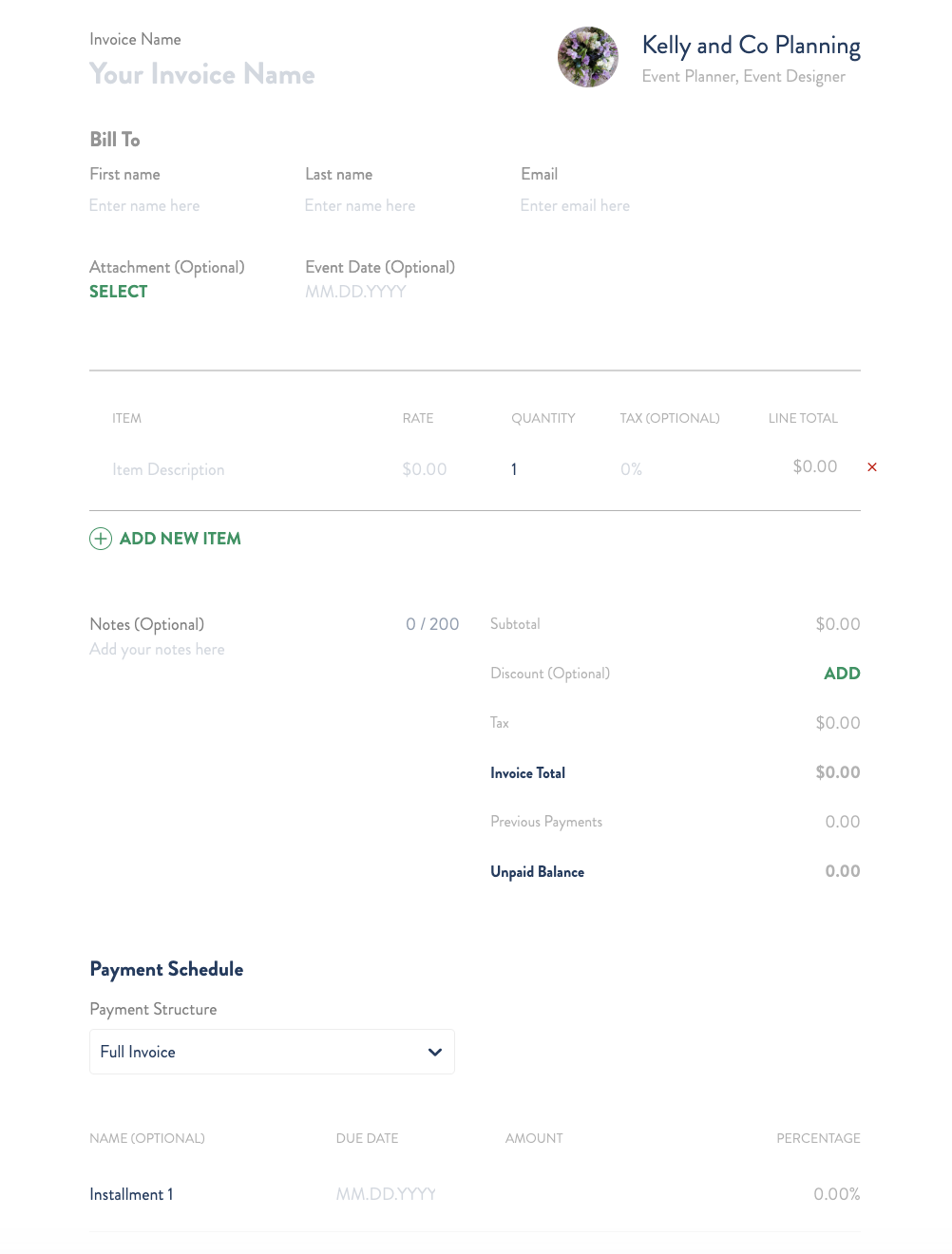As past wedding planners with over 20 years of experience at Rock Paper Coin, we know how hard pricing your services can be! Knowing how to charge as a wedding planner to remain competitive and make sure you’re still making money is a delicate balancing act. That’s why it’s important to have a solid wedding planner pricing template.
After all, wedding planning is a time consuming and high stress job. You don’t want to price yourself too low and make your business not worth it. And you don’t want to price your services too high, sending potential customers elsewhere.
Whether you’re a brand new wedding planner looking for some pricing assistance or a seasoned veteran wanting a health check on your invoices, we have the perfect wedding planner pricing template for you.
With this guide, we’ll give you some pointers on pricing, tiers and invoices for your wedding planner business. Plus, we’ll show you how to make your business run even smoother by utilizing new software.
Don’t Mystery Shop the Competition
Skip mystery shopping your competitors. In today’s community over competition industry, this is a big no-no. Instead of wasting a competitor’s time on a fake inquiry, simply ask them out to coffee.
In every market, the wedding industry is a small and well-connected group of people — so don’t get off on the wrong foot with price shopping. Feeling shy to ask what others are charging? That’s okay too — connect with vendors in your geographic area, but not in the same category and start to understand their pricing model. Doing so will give you a good idea of going rates if you are unfamiliar.
Know Your Local Market
One of the biggest drivers for your pricing is your location. It’s important to understand where you are operating your business and a rough hourly pricing for wedding planners in your market.
As founders of the best wedding planning software for wedding and event planners, we have some unique industry insights as to how much you should expect to charge. Delving into some data from our Rock Paper Coin planner software reveals that location really matters when it comes to pricing.
A few examples of wedding planner pricing we pulled from our network:
- Portland, OR: $85/hour
- Los Angeles: $150/hour
- North Carolina: $75/hour
And here are some examples of how much wedding planners charge according to ZipRecruiter:
- Kentucky: $45/hour
- New York: $200/hour
- Dallas: $36/hour
These are ranges, not rules. What you ultimately ink into your wedding planner pricing template will depend on other factors, like experience and packages offered.
Experienced Wedding Planners Can Upcharge
Now that you have some base pricing for your hourly target, it’s important to also take into account your experience and seniority within the industry.
If you are just starting out, it is probably best for your first two years to fall a little bit under the average hourly rate — so long as you are still making money on your packages (more on this below).
For more seasoned planners, going 20-30% above the market rate is very reasonable.
How to Charge as a Wedding Planner: Package Pricing
Before you start diving into website design and social media, first understand how you are going to price your packages. From your work above, you should have your hourly rate nailed down, so from here you can get a sense of what your packages should look like.
Pricing your wedding planning package is a mix of two things:
- Total hours you will be working
- An additional fee to cover the backend of your business
The first part about hours is pretty straight forward — you calculate how many hours you typically work within a package and multiply it by your hourly rate.
The second piece is a little trickier. As past wedding planners, we found it best to add in a percentage on top of our hours to cover additional expenses.
A great starting point for this additional fee is 18%. This additional fee covers expenses like a day-of assistant, backend software expenses, processing fees, etc.
This fee on top of your hours is really important because without planning for these expenses within your package price, you can end up upside down and losing money.
Below is a rough range of hours depending on package styles, so you can start to see a big picture.
Package type: Day-of in Portland, OR
| Number of hours | 20 |
| Hourly rate | $85 |
| Total cost for hours | $1,700 |
| 18% backend fee | $306 |
| Total cost for day-of package | $2,006 (round to $2,000) |
Package type: Partial Planning in Portland, OR
| Number of hours | 40 |
| Hourly rate | $85 |
| Total cost for hours | $3,400 |
| 18% backend fee | $612 |
| Total cost for partial planning package | $4,012 (round to $4,000) |
How Wedding Planners Should Charge for Full Service Pricing
Where things get a little trickier is Full Service pricing, but as past planners we are BIG believers in percentage pricing.
The idea behind this is that wedding planners should charge a backend fee that is based on the client’s final budget.
Why does this matter? If you end up with a client who hires a band from another state, your workload just doubled (think: coordinating travel, accommodations, schedules, etc). Tying your compensation to the overall budget ensures your workload is compensated correctly.
It’s important to always have a minimum contract amount, and then the percentage for anything above. Generally, Full Service starts at a minimum of $8,000 and goes up from there with percentages starting at 15%.
Of course with all of these packages it is important to note that the above pricing equation shows you how to get to your published price. When it comes to sharing the pricing on your website or with your potential clients, you only share the total price with them, not the full wedding planner pricing template.
Your clients don’t need to know how or why you came up with the package price — the pricing template is for you and only you to know.
The Best Way Wedding Planners Should Invoice
Your wedding planner pricing template can help you organize how much you should charge, but it doesn’t help you get paid.
As I stated before, making sure you are profitable at the end of a package is extremely important. And one of the biggest drivers in making this possible is making sure you are collecting funds and managing invoices efficiently.
That’s why accepting online payments is one the best decisions you can make for your business. Today’s couples are millennials and Gen Z, so catering to their digital demands by offering an online payment will ensure you are paid fast.
When to invoice is an important way to manage your company’s cash flow. If you are planning weddings during a more seasonal time, like the summer months, consider breaking up your invoice into three (or more) installments.
The first payment — the retainer — is the most important. The retainer should be noted as non-refundable and be 50% of your package price. The remaining installments can be in any denomination that works best for your business. However, it’s important to have received all payments four weeks prior to the event date.
By sending your invoices electronically you can build out one invoice at the time of booking for all the future installments. You can set due dates and your digital invoice will send out all the reminders for you. Gone are the days of tracking future payments — let our software do this for you!
Here’s a sample invoice using Rock Paper Coin — it’s easy and simple to use our online invoicing system.

Nailing down your pricing is incredibly important. But even more important is making sure you are getting paid on time, and that’s done by accepting online payments. Make your pricing work for you and your financial needs. Don’t feel pressured to discount or lower your prices — know your worth and be confident.
Want to take a look inside Rock Paper Coin? Click the button below to request a demo and find out how much easier we can make your wedding planner business.



